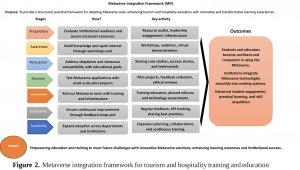Purpose
The purpose of this study is to explore the potential for tourism and hospitality education and training through immersive metaverse learning. This study examines familiarity levels, perceived benefits and challenges and proposes a framework for metaverse adoption in education and training.
Design/methodology/approach
Grounded in Diffusion of Innovation Theory, this qualitative study analyses 45 in-depth interviews with students and academics in Saudi Arabia. The thematic analysis identifies adoption stages and factors influencing metaverse readiness in tourism education.
Findings
While metaverse can enhance engagement in skill development, it may also include barriers such as accessibility, data privacy and technical readiness. Adoption varies by generation and digital proficiency. Younger students and early-career academics embrace its experiential benefits, while senior academics cite cost, infrastructure and complexity concerns. This study develops a DOI-based framework to evaluate metaverse adoption in tourism education.
Research limitations/implications
The findings of this study are context-specific and qualitative. Future research should validate the proposed model across different educational and cultural contexts using longitudinal and mixed-method approaches.
Practical implications
The metaverse Integration Framework provides actionable guidance for educators, policymakers and institutional leaders. This study supports phased integration, risk mitigation and alignment with governance structures, while addressing issues such as digital equity, funding and compliance.
Social implications
Metaverse technologies offer opportunities to democratise access to high-quality, immersive education, particularly in under-resourced or remote regions, thereby enhancing employability and workforce resilience.
Originality/value
This research contributes to the literature on metaverse adoption in tourism and hospitality training and education by introducing a DOI theory-informed framework. The findings of this study offer theoretical insights that bridge technology adoption models with educational practice, providing a foundation for future digital education and training research.












 SPROUT: From Sustainable Research to Sustainable Research Lives
SPROUT: From Sustainable Research to Sustainable Research Lives BRIAN upgrade and new look
BRIAN upgrade and new look Seeing the fruits of your labour in Bangladesh
Seeing the fruits of your labour in Bangladesh Exploring Embodied Research: Body Map Storytelling Workshop & Research Seminar
Exploring Embodied Research: Body Map Storytelling Workshop & Research Seminar Marking a Milestone: The Swash Channel Wreck Book Launch
Marking a Milestone: The Swash Channel Wreck Book Launch ECR Funding Open Call: Research Culture & Community Grant – Application Deadline Friday 12 December
ECR Funding Open Call: Research Culture & Community Grant – Application Deadline Friday 12 December MSCA Postdoctoral Fellowships 2025 Call
MSCA Postdoctoral Fellowships 2025 Call ERC Advanced Grant 2025 Webinar
ERC Advanced Grant 2025 Webinar Update on UKRO services
Update on UKRO services European research project exploring use of ‘virtual twins’ to better manage metabolic associated fatty liver disease
European research project exploring use of ‘virtual twins’ to better manage metabolic associated fatty liver disease